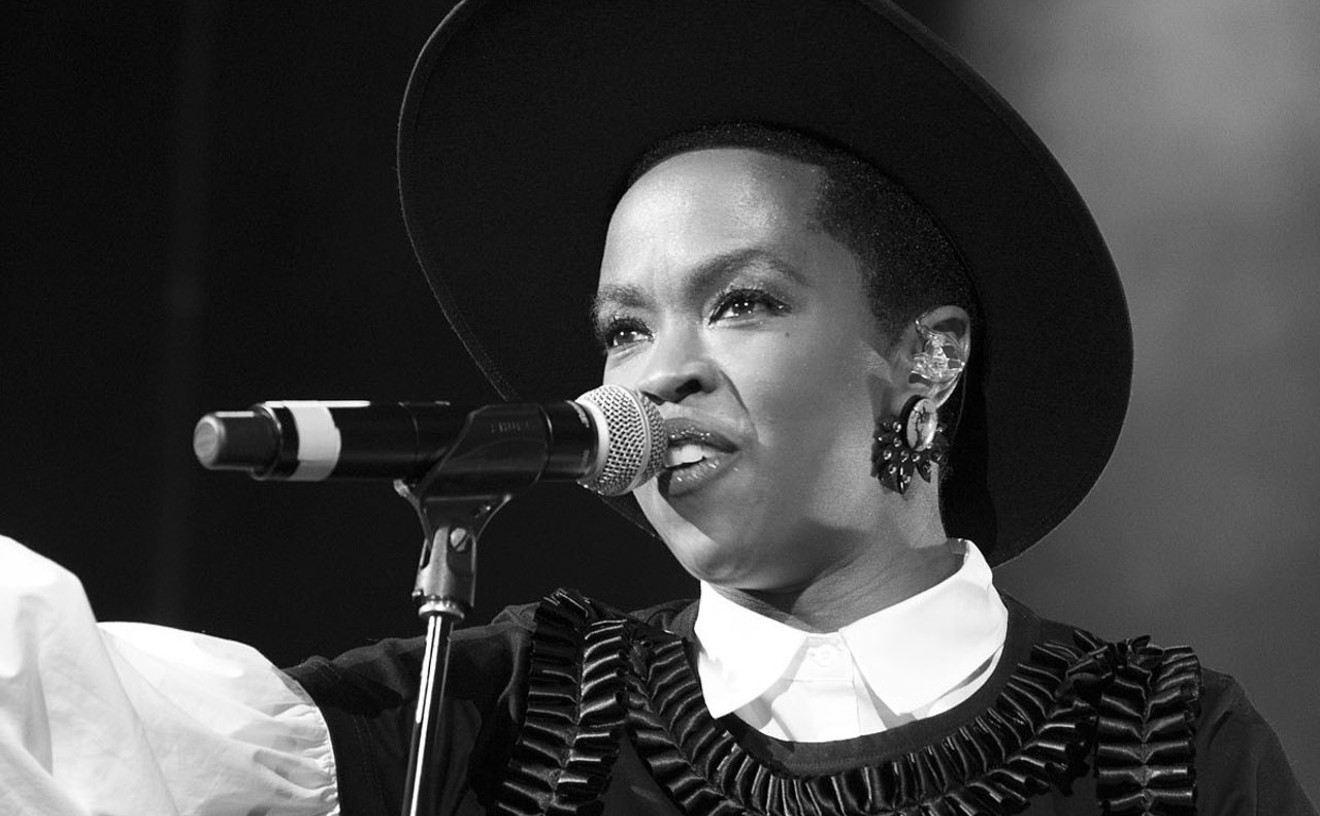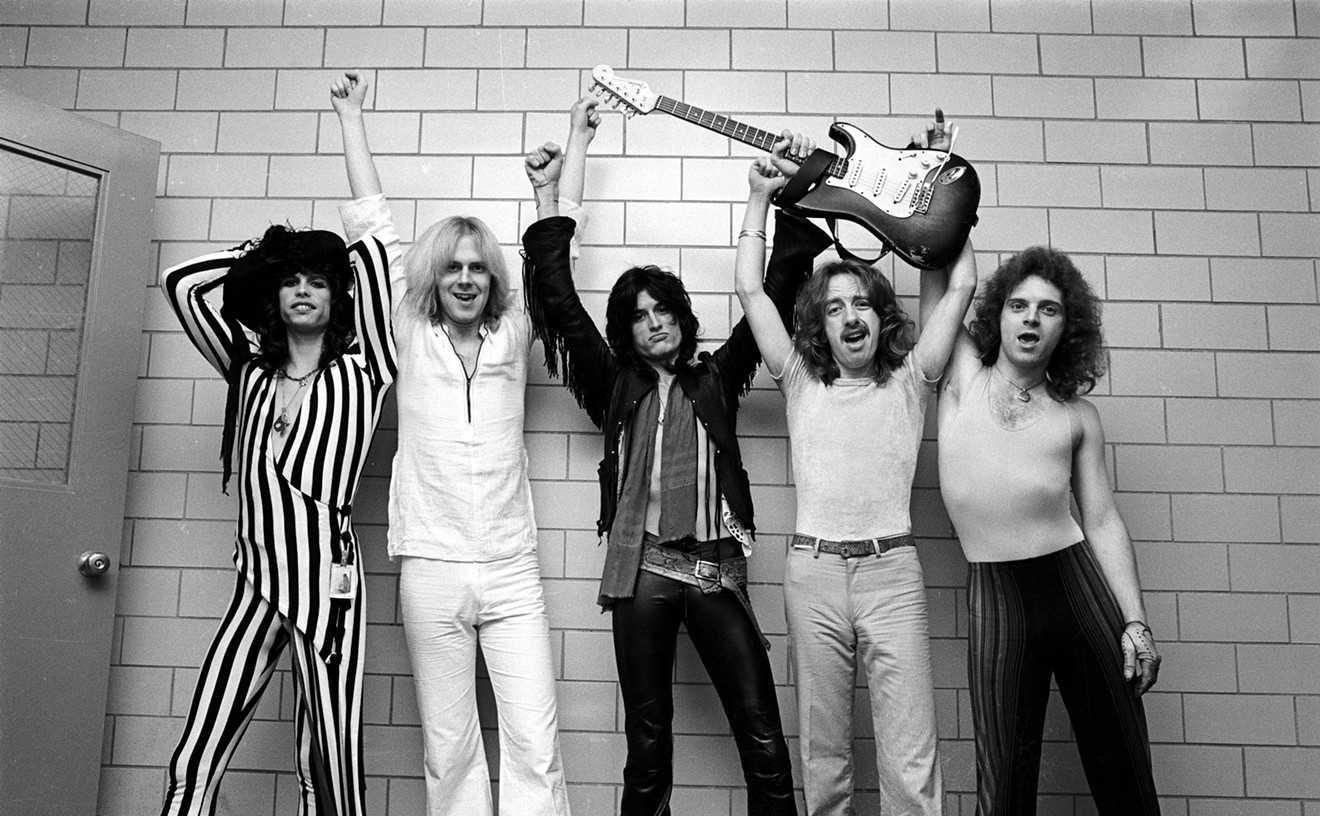Calling the warehouse space where Mesa-based band The Rÿche rehearses a "practice space" doesn't seem fair. Behind heavy metal doors, the room is equipped with a full stage, lined with couches, gig posters, and a sound system that actually puts those at some Valley clubs to shame. In front of the stage, a dozen or so TVs are stacked, flickering video synchronized with the band's on-stage volume.
Jay Redline, the band's manager, ushers me in from the parking lot, where a collection of the band's friends gather around a pickup, and offers me a seat on a worn-in sofa. Wearing a low-slung baseball cap and loose blue jeans, he talks a mile a minute, hyping the band like a seasoned L.A. pro.
He introduces me to the guys just as they finish a tune. He suggests the band play something for me, and following his command — something to the effect of "rock this guy"— the band launches into "I Don't Believe in Love," one of progressive rock band Queensrÿche's better-known songs, from their 1988 rock opera Operation Mindcrime.
Pre-recorded tracks whisper through the sound system: "Why'd you do it? Why'd you do it," only to be interrupted by a shout of "No!" as the guitars roar in. For the next five minutes or so, the band performs a note-for-note version of the hit, as the TV screens flash black-and-white footage of an asylum interspersed with the Rÿche logo.
Singer Norm Saavedra belts out the lyrics and twirls his mic stand, though he's slightly less prone to karate moves and spinning than Queensrÿche singer Geoff Tate in his prime. Guitarists Mike Hodges and Dave Lansing execute the guitar work of the album version and even duel and play side-to-side the way Queensrÿche guitarists Chris DeGarmo and Michael Wilton do in the video. Bassist Mace Pool matches the exact tone of Queensrÿche bassist Eddie Jackson, and drummer Gabe Hansen replicates Scott Rockenfield beat for beat. The chorus of the song soars with four-part harmonies, and Redline claps and cheers as the band reaches the finale of the song, with Saavredra reaching deep for the crescendo high note.
I'm not a Queensrÿche expert. Which isn't to say that I dislike the band; it's just that I've never spent much time listening to them nor had any desire to. Sure, I've heard "Silent Lucidity," and found it a little more tolerable than power ballads of a similar ilk. But since sitting in on that practice, I've probably watched the official video for "I Don't Believe in Love" on YouTube 15 times, and I can't say that I would be able to tell the difference between what I heard that night and what's coming out of my computer speakers with my eyes closed. The band's dedication to what they do is so intense it borders on ridiculous.
The Rÿche has been performing concerts for the past three years, mostly at hard rock bars like Club Red, and have earned a reputation as one of the Valley's premier tribute acts, along with The Noodles (The Grateful Dead), Too Fast for Love (Mötley Crüe) and UnSkinny Bop (Poison).
Along the way they have earned kudos from the official Queensrÿche camp. Last year, they played an official pre-show when Queensrÿche brought their "Cabaret" tour to the Orpheum Theatre, and have performed with Pamela Moore, who appeared as "Sister Mary" on Operation Mindcrime.
Unlike many cover bands, Redline stresses that The Rÿche aren't Queensrÿche imitators. "They don't dress up; they don't act like the members of the band. It's about the music."
"You hear a Queensrÿche record, and that's what we sound like," Hodges says. "We don't do it to be better than anyone. We do it to pay tribute to one of the best rock bands ever."
The band's roots trace back to an original band the members were part of, sans Saavedra. "We were all in an original band called Primary," says Hodges, describing the band as a "nu-rock" band like Sevendust, Korn, and Three Days Grace.
"There's a different freedom when you are doing your own thing. You can interpret things differently because it's your own voice," he says. "With this, it's more looking down the barrel, trying to pinpoint exactly were it's at. It's a different concentration."
Hodges and Saavedra hatched the idea for the band on a road trip to Las Vegas. "Me and Norm have known each other quite some time. We had played in a bunch of bands together," Hodges says.
"We were driving, just blasting Queensrÿche, and singing our brains out. We thought, you know what would be really cool? We should start a tribute band. This was kind of when all the tribute bands were hitting. But we never really got around to it. Then we got free — he was out of his band, and I was out of mine — and we just sort of threw it together and it worked really well."
While indie singer-songwriters and serious music nerds may scoff at the notion of succeeding off the songs of another artist, The Rÿche take their craft seriously, acting less like artists and more like skilled laborers. They focus on early Queensrÿche, excluding songs from recent albums like Operation Mindcrime II and American Soldier.
"We love the new albums, [but] there is more of an audience for the early stuff. The newer stuff is amazing, but how many people are going to know that stuff? Are we doing it for us or for them? With this kind of band, you have to do it for them: the fans."
The band plays only three or four local shows a year, and spends the rest of the time playing tribute band events out of state.
The decision to play solely the music of Queensrÿche makes perfect sense.
"In any cover band you're ever in, you are only as good as your singer," Lansing says. "Whatever you play with a different singer, you play to their strong points. You find a singer who sounds like Billy Joel, to best suit the band. Now, you come across him, I don't think there's anyone who sings Queensrÿche as good as him, except for Geoff Tate himself."
"I'll agree with that," Saavedra says with a laugh.
"That's why I became a singer. Listening to Queensrÿche, I loved it so much, and I was actually able to sing that stuff," Saavedra says.
The band members rattle off their other favorite bands: stock metalhead fare like Dream Theatre, Judas Priest, Iron Maiden, and Dio. (Pool interjects with Barry Manilow, though I'm fairly certain he was kidding.)
"If you asked each of us [our favorite band], we'd all have a different answer. But we have intense common ground on this," Lansing says.
I ask the band whether they get bored playing only Queensrÿche, and the members answer "no" in near-unison. Despite their devotion, the group has decided to hang up The Rÿche in favor of a more lucrative project: a "one-hit wonder" cover band designed to "have fun and make some money at casinos."
The band doesn't feel like much can top their next show, anyway. Queensrÿche singer Geoff Tate will be on hand at Club Red to pimp his wine brand, Insania. The band is hoping they can persuade him to share vocal duties for a few songs.
"Where do you go from there?" Saavedra asks. "That's what we've been working toward, to play with them or some of them. Sharing the stage with Geoff, after that, I could pretty much die happy."
The band won't rule out a few reunion gigs, though.
"When I first heard Queensrÿche, I was like, oh, my God, who are these guys? They are frickin' amazing," Hodges says. "I've been listening to these guys since high school. I don't think we would ever close ourselves off to the idea of playing again, if the right situation came about."
"We'll pull it off the shelf and dust it off," Saavedra says.











